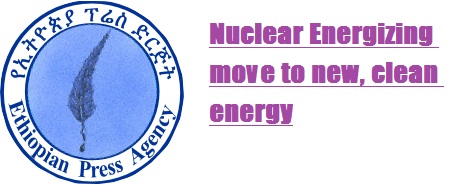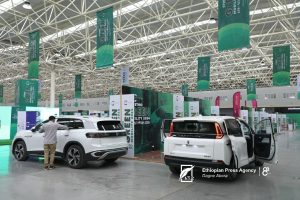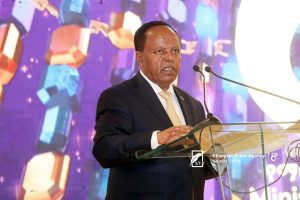
Driven by expanding economy and sharp population growth, Ethiopia’s energy demand is growing at an alarming rate. And experts are advising for energy diversification, most suggesting to include nuclear energy in the list—what would be a longtime project yet reliable source of energy.
Despite a leap in growth in hydro energy generation over the last couple of years, with its clean and renewable energy production efforts, power has been in short supply in the country while large portion of rural population remain off the grid.
Frequent power blackout has also been major source of public grievances. And at this time, the problem reached fever pitch. Owing to a decrease in water volume at most dams of the country, there has been power outage lately. The government has even introduced ration system in electricity supply across the country.
Over the years, the country constructed multiple hydropower plants. But the demand has been far from enough and experts are advising the country to look for other alternative sources of energy. Nuclear energy despite its capital intensity is one of the sources which the country sees as a long-term plan to meet growing energy demand.
Ethiopia and Russia agreed to enhance engagement in the development of nuclear energy facility in Ethiopia during Russian Foreign Minister Serge Lavrov’s visit to Addis Ababa. Talks have been underway to establish nuclear technology center on the existing Russia design research reactor. The work is progressing and will be accelerated once the inter government agreement is signed.
The country has started a nuclear development roadmap with Russia recently which would allow the former to use nuclear in agriculture, health and manufacturing sectors.
The signing follows an earlier memorandum of understanding, signed in June 2017 that established a legal framework for nuclear cooperation. The roadmap determines specific steps in strengthening bilateral cooperation in the field of peaceful use of atomic energy.
The parties have identified joint actions within the framework of a nuclear power plant construction and center for nuclear science construction projects. A general agreement on cooperation between the two countries in the sphere of nuclear energy use for peaceful purposes is on the table of both sides. A Nuclear Research Center based on the Russian design is planned for the construction on the Ethiopian territory in the nearest future, states Russian Ambassador to Ethiopia Yevgeny Terekhin.
Ethiopia is extremely reliant on hydropower plants. However, the rapid population growth and expansion of industries surly put onus on the country to look for other reliable sources of energy. Hydropower could easily be affected by natural phenomena such as drought. So the country’s decision to use nuclear energy is imperative, says Dr.Tilahun Tesfaye assistant professor of nuclear science at the Department of Physics in Addis Ababa University.
“It would be in the best interest of the country if it diversified energy sources. And nuclear energy is the best alternative being one of the cleanest and safest energy sources,” argues Tilahun. Nuclear energy is reliable and has good safety record, he adds. Countries should be ensuring their energy security if the economy and political situations are also to be stable. Energy shortage is one of the major sources of public outcry, he adds.
Though effectively utilized in developed countries, nuclear energy is also becoming increasingly popular in dozens of African countries with neighboring Kenya showing progress towards the energy development. Nuclear energy, despite its capital intensity and political implication, should not be luxury to countries like Ethiopia.
Nuclear energy requires huge economic investment and political dealing as the world remains skeptic on the purpose of nuclear enrichment. One of the major constraints that would challenge Ethiopia’s planned nuclear energy development could be financial constraints, and expertise to run and operate the facility, he says.
Learning institutions should be educating nuclear scientists and engineers who can run the facilities. Also powerful nation’s pressure on poor countries effort of nuclear energy development, fearing governments could be using for weapon development could be another rocky road. Hence it behooves the country to strengthen its diplomatic works.
“With nuclear energy also comes some risks such possible radiation and leak, hence the country needs to build the capacity of regulatory bodies ahead of such move.” He says “nuclear power plant could give the country much energy than hydro ones. Thus it is worthwhile that the country should be working relentlessly on it.”
The Ethiopian Herald, June 14/2019
BY DESTA GEBREHIWOT





